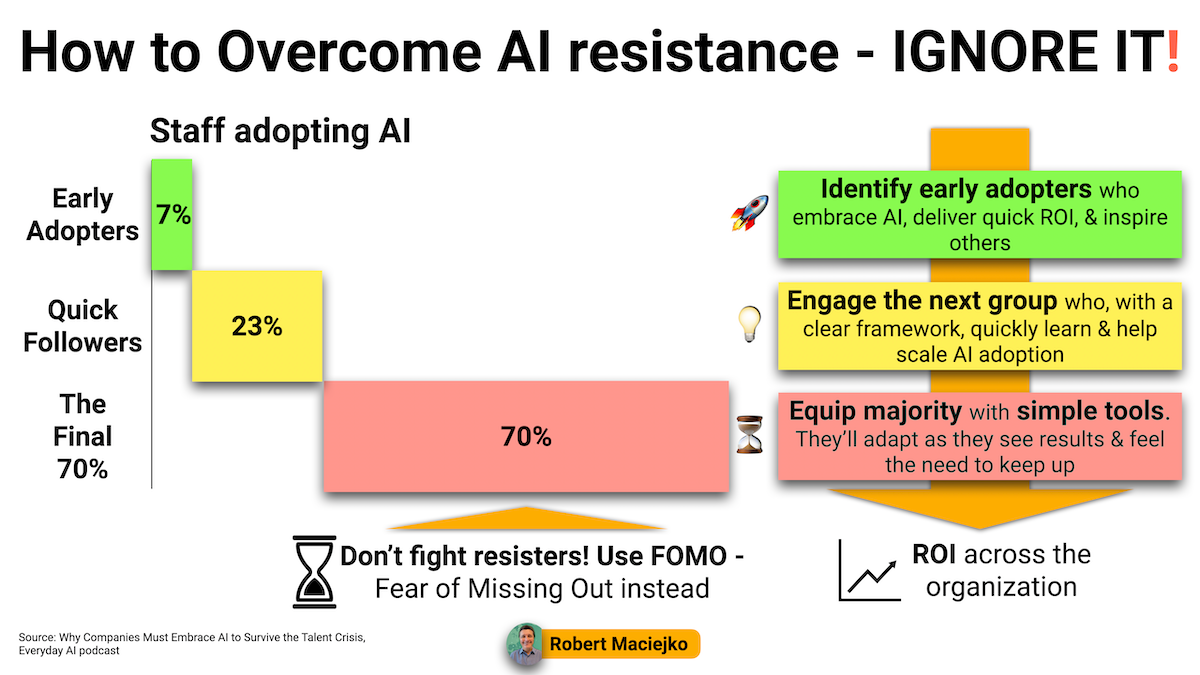
Overcoming Resistance to AI Adoption in Organizations
May 06, 2025
AI adoption
technology resistance
ethical concerns
organizational culture
education
innovation
Organizations face resistance to AI adoption due to fear of the unknown, lack of understanding, ethical concerns, and cultural barriers, but can overcome these challenges through transparent communication, education, and fostering a culture of innovation.
Reasons for Resisting AI Adoption
Several key factors contribute to resistance against AI adoption in organizations. Here are the primary reasons:
- Fear of the Unknown: Many individuals and teams resist AI due to technology anxiety—a fear or apprehension experienced when faced with new or unfamiliar technologies. This is particularly prevalent in procurement and other sectors where AI represents a significant shift from traditional practices.
- Lack of Understanding and Education: Misconceptions about AI’s capabilities and its role in specific functions, such as procurement, lead to resistance. Without proper education, employees may perceive AI as a threat rather than a tool to enhance their work.
- Ethical and Privacy Concerns: AI systems require vast amounts of data, raising concerns about data integrity, biases, and privacy. Organizations worry about ethical decision-making and compliance with regulations like GDPR.
- Lack of Trust and Job Security Fears: The "black box" problem—where the internal decision-making process of AI is unclear—creates mistrust. Additionally, employees fear job displacement, even though AI is designed to complement human roles rather than replace them.
- Organizational and Cultural Barriers: Leadership’s technology anxiety and a risk-averse culture can hinder AI adoption. Organizations with legacy systems may resist change due to perceived disruption and costs.
- Inadequate Infrastructure and Expertise: Many organizations lack the necessary infrastructure, technical skills, and expertise to implement AI effectively, making adoption challenging.
- Resistance to Change: Humans are naturally resistant to change, especially when it involves adopting new technologies that disrupt established workflows and processes.
Strategies to Overcome AI Resistance
To address these challenges, organizations can adopt the following strategies:
- Transparent Communication: Engage employees early and often in the AI adoption process to reduce anxiety and build trust.
- Education and Training: Equip employees with a clear understanding of AI’s capabilities and limitations to demystify the technology.
- Address Ethical Concerns: Establish robust data privacy policies and ethical guidelines to alleviate fears about data misuse and biases.
- Demonstrate Benefits: Showcase successful AI implementations and highlight how AI can enhance, rather than replace, human roles.
- Foster a Culture of Innovation: Encourage experimentation and adaptability to reduce fear of failure and promote a positive attitude toward AI adoption.
By addressing these barriers and implementing these strategies, organizations can successfully navigate the challenges of AI adoption and unlock its transformative potential.
Sources
Challenges of AI Adoption: 5 Reasons for AI Resistance ... - Fairmarkit
1. Fear of the Unknown: Resistance to New Technology · 2. Lack of Understanding and Education: The Role of AI in Procurement · 3. Ethical ...
Six key reasons why many organisations are not ready for AI adoption
Six key reasons why many organisations aren't ready to adopt AI · Data · Infrastructure · Expertise Gap · Resistance to change · Awareness in ...
7 Reasons Why People Resist AI Models and How to Overcome Them
7 Reasons Why People Resist AI Models · 1. Fear of Job Loss · 2. AI is a “Black Box” · 3. Accountability · 4. Lack of Alignment · 5. Different ...

